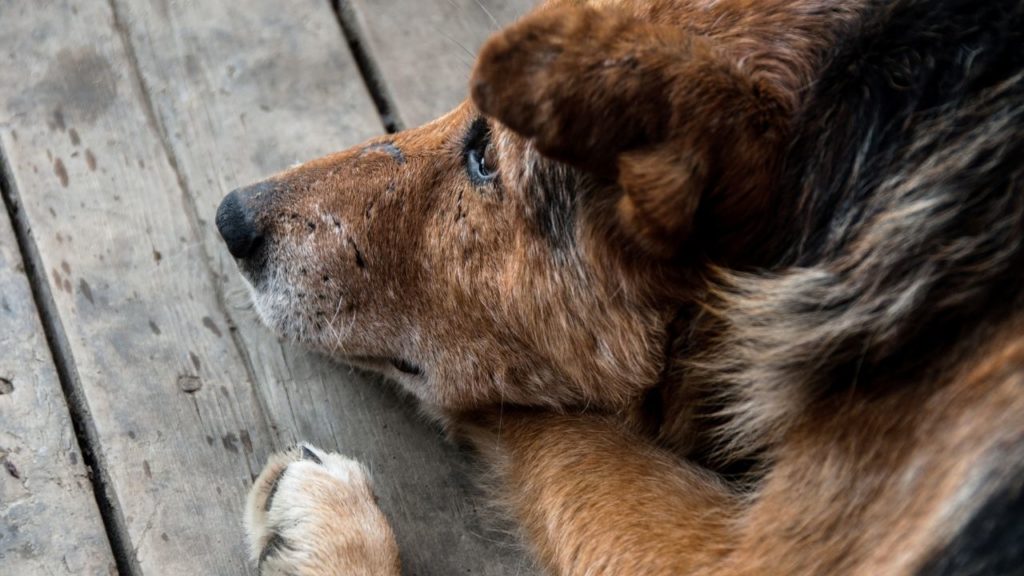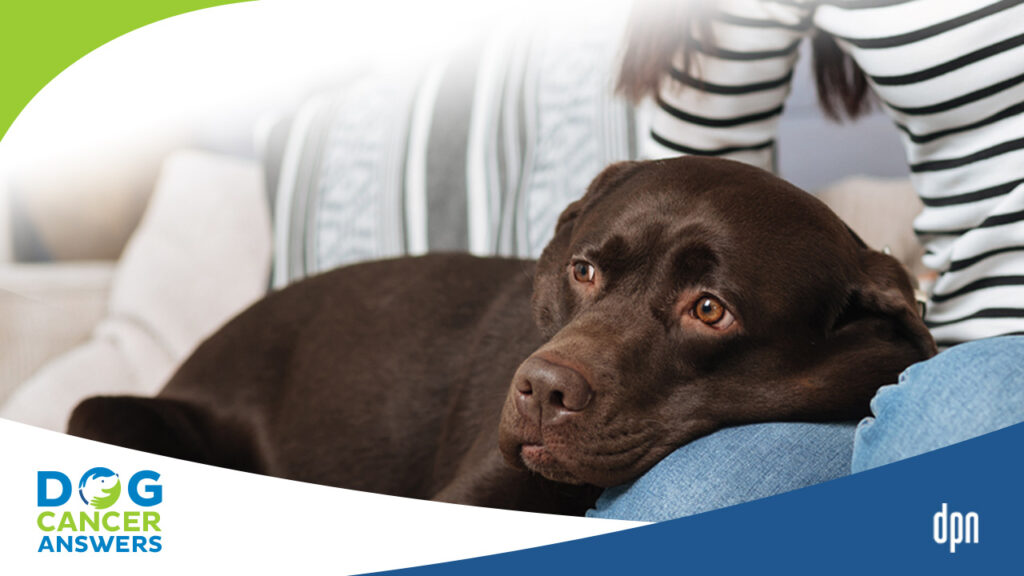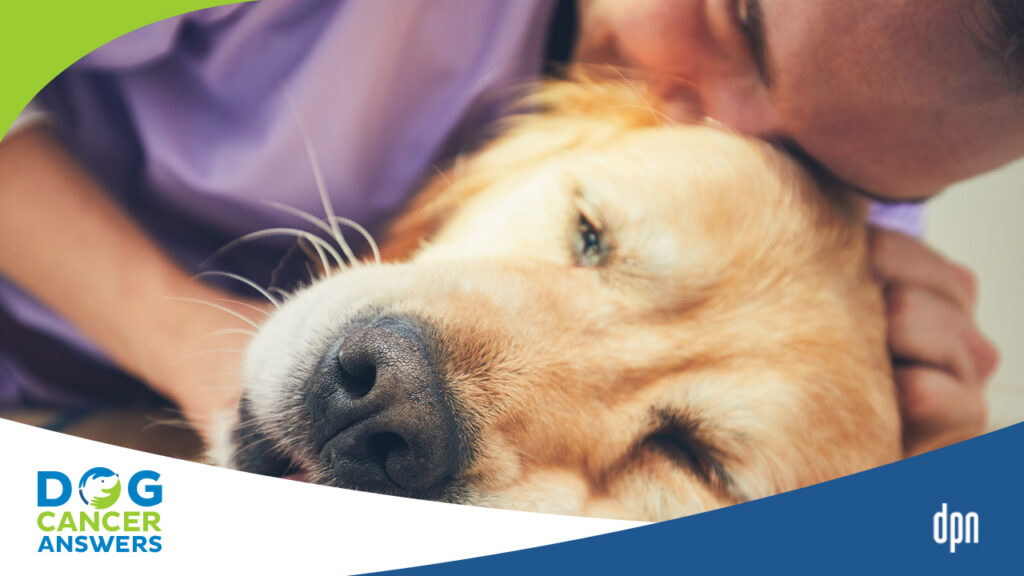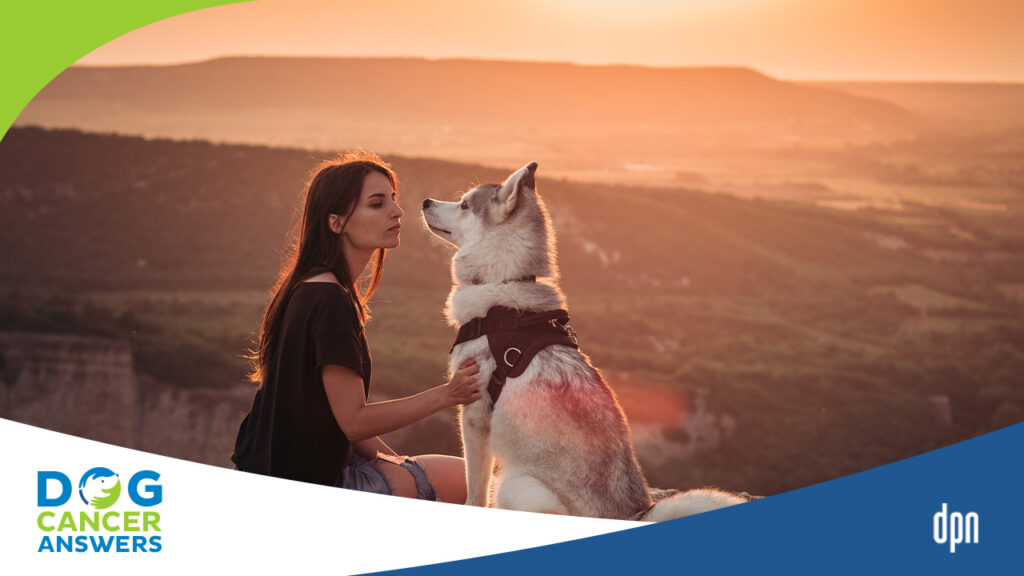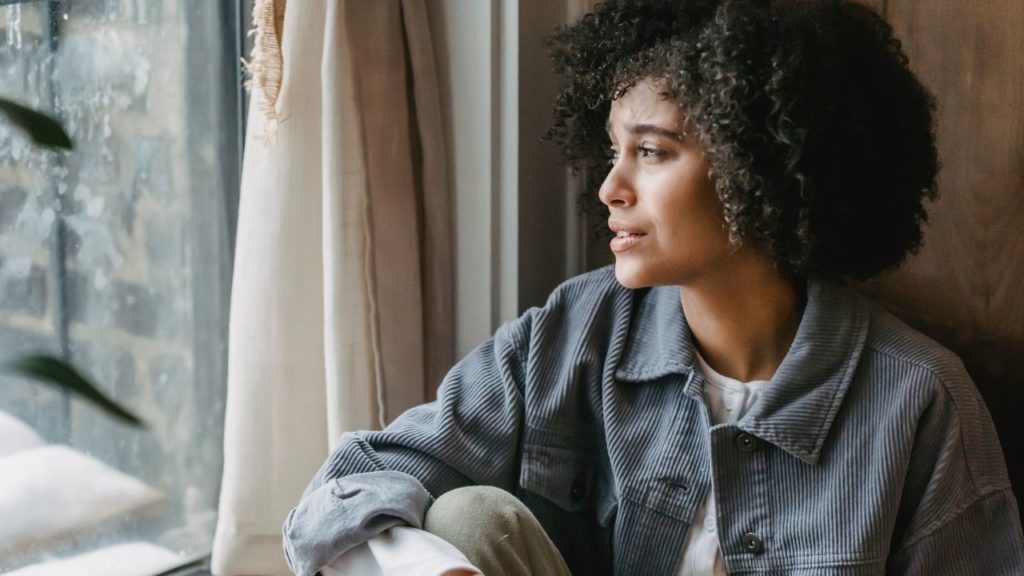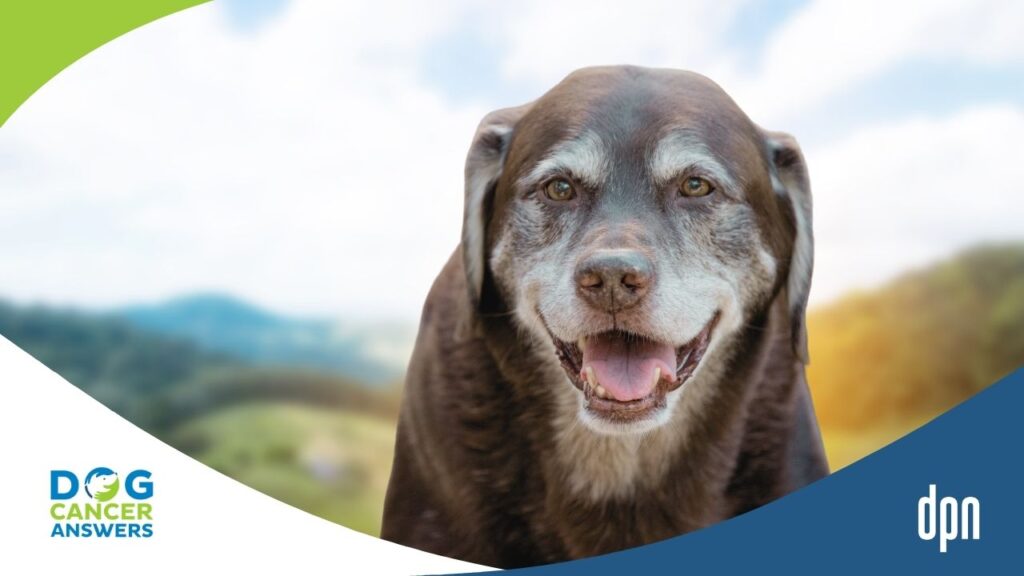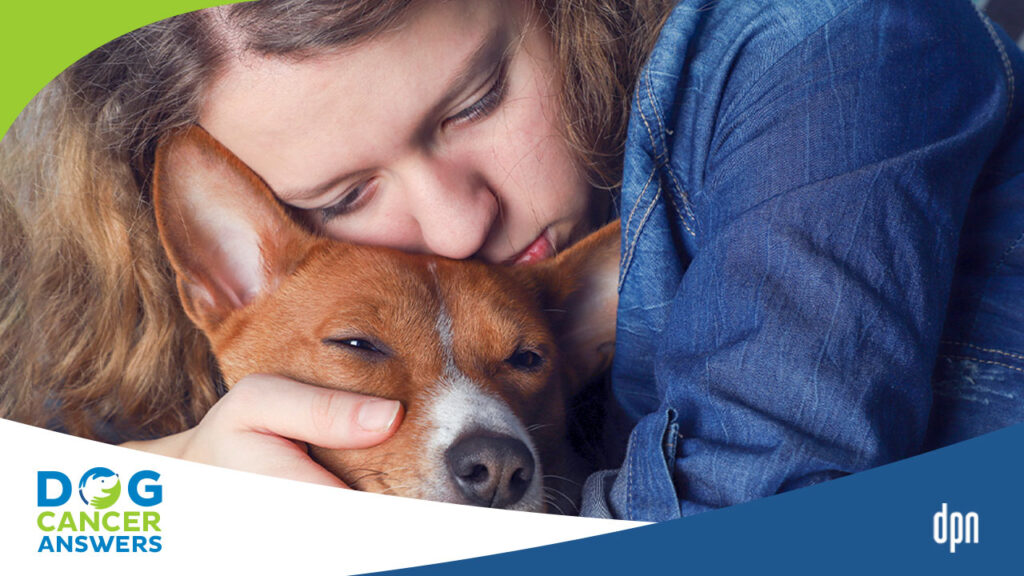EPISODE 142 | RELEASED November 22, 2021
Euthanasia for Dogs During the Holidays: Why You Shouldn’t Feel Guilty | Molly Jacobson and Kate Basedow
Anecdotally, vet professionals note an increase in euthanasias during the holiday season. Having to make this decision can make a joyful time very stressful.
SHOW NOTES
Losing a beloved dog is always hard, but it can be even more heartbreaking during the holiday season.
But while we as humans put a lot of value in specific dates and times, our dogs do not. Your dog will not mind if you celebrate a favorite holiday with him a few weeks early because his health is failing – after all, every day spent with you is a holiday to him.
You are not alone if you have had to say goodbye to a dear pet during the holiday season. The short, cold days take their toll on sick and elderly dogs, and the bustle of the holidays can be stressful. Money may also not be as plentiful as other times between heating bills and gift giving.
Allow yourself the time you need to grieve, but also give yourself permission to enjoy the parts of the holidays that you enjoy. Share memories of your dog with close friends and family, and consider a thoughtful remembrance gift if a loved one has lost his or her pet.
Links & Resources Mentioned in Today’s Show:
How to Be There for Your Dog at the End with Lori Levine
The Dog Cancer Survival Guide: Full Spectrum Treatments to Optimize Your Dog’s Life Quality and Longevity by Dr. Demian Dressler and Dr. Susan Ettinger
[00:00:00] >> Molly Jocobson: Our dogs do not have that sense, and every day is, is a holiday for them. And I just really think if you are in tune and really paying attention, and you know that, then you’re going to, you’re going to be able to handle the whole thing a lot better. If you really can look back and say, yeah, but I was really there with them.
Because that’s ultimately what they want. That’s what they want more than anything else. It’s your presence.
[00:00:28] >> James Jacobson: That’s why they call, it’s a, it’s a gift. It’s, it’s your presence. And enjoy the time with them.
[00:00:32] >> Announcer: Welcome to Dog Cancer Answers, where we help you help your dog with cancer. Here’s your host, James Jacobson.
[00:00:40] >> James Jacobson: Hello friend, saying goodbye to a loved dog is never easy, especially difficult when it happens this time of year during the holiday season. Some people say that there is an increase in euthanasia around this time of year, and to discuss that topic, we are joined by two guests. One is my wife, Molly Jacobson, who is also editor of the Dog Cancer Survival Guide, and the other is Kate Basedow, who is our associate producer here at Dog Cancer Answers. Ladies, thank you for being with us today.
[00:01:12] >> Molly Jocobson: Thanks for having us.
[00:01:15] >> James Jacobson: This, this is a difficult conversation. So I will start with you, Kate, partly because you are a licensed vet technician. Is there actually an increase in euthanasia during the holidays?
[00:01:32] >> Kate Basedow: There hasn’t been any formal study of it or research, but anecdotally many veterinary professionals do note an increase in euthanasias during the holiday season. And there are a variety of reasons for that.
[00:01:46] >> James Jacobson: So you’re saying, it, but I mean it hasn’t actually been scientifically documented, but this is just basically the experience that, that vet professionals have been having.
[00:01:56] >> Kate Basedow: Correct. You’ll frequently hear veterinarians and veterinary technicians say to each other, uhoh, here come the holidays, get ready for more emergency illnesses and euthanasia appointments.
[00:02:08] >> James Jacobson: So why does this happen?
[00:02:12] >> Kate Basedow: There’s probably a variety of different factors at play. One is, in the northern parts of the U.S. we’ve got the colder weather. And colder weather, for many senior and ill pets, since they’re already struggling a little bit, their immune system has to work that much harder as it gets cold to keep them warm and keep everything working properly. With the holidays specifically, you’ve also got the stress in the house. Even though the holidays are largely a happy and enjoyable time, there is still stress that comes with that.
[00:02:49] >> James Jacobson: Yes!
[00:02:49] >> Kate Basedow: Um, whether it’s traveling, if your dog isn’t used to traveling with you, or if your dog has to stay at the boarding kennel and doesn’t particularly enjoy that – and even dogs that like being around other dogs, it’s still stressful. It might be a better kind of stress, but there’s still that extra energy output.
[00:03:08] >> James Jacobson: Well, they can feel, they can feel, they can feel the stress in the household, whether it’s, you know, like more people coming over, or the stress that a lot of people may be feeling this year because they’re meeting with people in their family who are or are not vaccinated and there’s all sorts of stress in general and I guess, uh, dogs can pick that up.
[00:03:27] >> Kate Basedow: Oh, absolutely. The dogs pick up on our stress, and it can be stressful for them having strangers in their house, and the excitement of people that they know coming in and going.
And then you also have the financial aspect of the holidays. People are spending a lot of money on gifts, and travel of course, which is extremely expensive, and also heating bills for areas that are, have cold climates. And so there might not be as much money available if the dog does get sick suddenly to pursue veterinary care that they would have opted for other times.
[00:04:03] >> James Jacobson: Got it.
Um, so, Molly, you’ve had some experience with, uh, euthanasia around the holidays. What’s your anecdotal experience?
[00:04:15] >> Molly Jocobson: Well, I have had experience a long time ago with euthanasia around the holidays, actually when I was a child. Um, and I have to say it was pretty scarring, um, to associate the death of my dog with the holiday season.
Um, the holiday season can be-
[00:04:36] >> James Jacobson: You were a child? Or how old were you?
[00:04:38] >> Molly Jocobson: I was a child.
I was 14 I think. I was a teen. Um, but I, I really, I, you know, depending on your family dynamics, the holidays can be a joyful time, or they can be, let’s say more complex. And when they’re more complex, they’re more complex in every way. And then you add on top of that stress the death of a, of a dog or any pet really, then you’re getting really into some, just real, it seems to compound. I’ve experienced euthanasia at other times of year, and it wasn’t quite as complex and impactful as it was during the holiday. Kind of like, oh, another thing went wrong.
[00:05:26] >> James Jacobson: Because you associate that and there’s such high expectations of "This is going to be the perfect holiday!" And then you look at Rover…
[00:05:32] >> Molly Jocobson: Right, and please, like maybe this year it’ll be really great, and then it’s not, and then your dog dies. That’s not fun. Um, so it is really, and I think we have a lot of guilt too, around the holidays, don’t we? Because we think that they should be perfect and it should be wonderful, and of course we want our dogs and our cats and all of our pets to be a part of that warm, cozy, you know, let’s cuddle in and, I don’t know, eat popcorn and drink hot chocolate and enjoy our family’s company. And, and then one of them is, is sick and then has to go. It’s just horrible. And if, if, um – this wasn’t the case for me, but I know people whose, who’ve had to euthanize their dogs because their dogs got into like holiday treats like chocolate.
And that is just, I can’t even imagine how stressful and upsetting that would be to feel like the thing I brought into the house to enjoy and make a cozy, warm holiday is the thing that was the end for my dog.
[00:06:31] >> James Jacobson: So Kate is that, is that, is that, it seems like you’re nodding your head. It seems like that is actually a something that, that veterinary clinics are seeing is, it’s not so much, uh, dogs that have long-term diseases, although I know that’s a big component of it, but dogs who get sick because of something in the holiday house.
[00:06:49] >> Kate Basedow: Yup. Absolutely. Um, growing up, my mom used to always make fudge for all of our teachers, for my brother and I, and we would take the fudge in and give it to our teachers and our friends and everything, and it was this big ritual that we all enjoyed. Um, and one year we had gone out to dinner or something, and the fudge was left in my brother’s backpack, and my brother left the backpack open. And we had, and six dogs were loose in the house at that time. So we came home to all the fudge gone and no idea how many were guilty.
We, one of the dogs was a senior Corgi, so my mom decided, you know what, I’m not going to put her through the stress of vomiting. If she gets sick, we’ll deal with it, but we’re going to hope for the best. She was also one of the more reliable dogs in general. The other five, we had to give perox- hydrogen peroxide to and walk them outside in the frigid cold until they vomited. It turned out three were guilty, two were not.
[00:07:50] >> Molly Jocobson: My goodness.
[00:07:51] >> Kate Basedow: It was not the most fun night, but could have gone much worse if we hadn’t come home soon enough to make them vomit immediately. Or luckily all of our dogs were at least 25 pounds or more, so it takes a higher dose of chocolate for them to have really dramatic effects or to die from the poisoning.
Also some other-
[00:08:16] >> James Jacobson: You were also lucky in that situation because your mom is a vet.
[00:08:19] >> Kate Basedow: Yes. Very true.
[00:08:20] >> James Jacobson: You know, is there a vet in the house? Why, why yeah!
[00:08:24] >> Kate Basedow: Yup. Um, my mom has also dealt with cases where client dogs broke into boxes of coffee that were given as gifts and things like that. Oh yeah. Any food gifts, maybe you, I know you want it to be a surprise, but, tell, give people the heads up if they have a dog, like, Hey, this package has food in it. Keep it up or keep your dog away from the tree so that they don’t rip open that beautiful wrapping paper and get themselves into trouble. Um, the other-
[00:08:54] >> James Jacobson: In Hawaii we have, uh, chocolate covered macadamia nuts. So those are two really bad things for dogs.
[00:08:59] >> Kate Basedow: Mhm. Yup. Great for people, not so good for dogs. Poinsettias are also toxic to pets, so keep those out of reach. And if your poinsettia’s dropping leaves, pick those up. Um, Thanksgiving is a big holiday for pancreatitis, which can be fatal, and even when it’s not fatal, it’s really uncomfortable and unpleasant to deal with.
Um, so pancreatitis usually happens – the classic presentation around the end of November is, "My dog ate the turkey carcass," or "My dog ate all the pies," or "Grandma gave the dog a bunch of the Thanksgiving ham." And then a couple days later, the dog starts vomiting and vomiting and vomiting. And that definitely requires veterinary care.
Often they’ll need some fluids to help with hydration because of the vomiting. They can be giving, given medications to stop the vomiting, and they might need some other supportive medications and care as well.
[00:09:59] >> Molly Jocobson: Oh, I’m reminded –
[00:10:01] >> Kate Basedow: No fun.
[00:10:02] >> Molly Jocobson: Jim, do you remember many years ago, uh, this is a bad, this is Molly being a bad dog owner.
Um, we got a box-
[00:10:09] >> James Jacobson: I remember that.
[00:10:10] >> Molly Jocobson: Yes, we got a box of, um, chocolate covered macadamia nuts as gifts. We didn’t know what was in it, but it was pretty clear from the package what it was. And I just the it at the bottom of the stairs before we went out for New Year’s Eve. And when we came back Maui, our eight pound Maltese, had opened and half of the chocolate covered macadamia nuts were, were gone. And it was New Year’s Eve, so there was an emergency situation and it was absolutely terrible. It was the wrong way to bring in the new year. It was terrible. She survived it, because she was one of those dogs who can survive just about anything.
[00:10:51] >> James Jacobson: She was a dog who ate rat poison when she was young.
[00:10:54] >> Molly Jocobson: She almost died.
[00:10:55] >> James Jacobson: She lived to 16, so.
[00:10:57] >> Kate Basedow: Some dogs have nine lives.
[00:10:59] >> Molly Jocobson: She had like 20.
Um, but yeah, that was terrifying. I don’t think I got over that guilt for years. You know, I think it took like, a like, like, thankfully it was early in my relationship with Maui – because she was your dog before I met you – and so, so I had many years of, of proving to myself that I wasn’t the worst person in the world and that the dog loved me.
[00:11:21] >> James Jacobson: My first true love. Well, speaking of Maui, because this is all about me, but speaking of, of, of, this concept that people have of being really close to their dog: they tend to do this thing called benchmarking, which is that I want to get through this holiday. I want her to see this new year. Uh, that I think seems like it would add to the stress and anxiety that a lot of people feel about euthanasia this time of year.
Kate?
[00:11:50] >> Kate Basedow: Oh, absolutely. Um, it’s kind of natural as humans to put a lot of weight on the specialness of the holidays and the whole family being together, and our dogs are part of the family. And so it’s very easy to do exactly what you’re describing and get hung up on getting the dog to that benchmark holiday.
Um, while it feels significant to us, it’s important to remember that your dog doesn’t care what day it is. Every day is a holiday to your dog because they are with you. And so it’s important, it can be very difficult for us, but it’s important for the sake of our dogs to evaluate their quality of life and their health and how they’re doing independent of the time of year or what special days are coming up.
And if you’re feeling like it might be getting toward the end, you can always celebrate early with your dog. And your dog won’t know that it’s December 16th.
[00:12:50] >> James Jacobson: They don’t have a calendar.
[00:12:51] >> Kate Basedow: Exactly. Or that it’s December 27th instead of the new year, New Year’s Day.
[00:12:57] >> James Jacobson: Right.
[00:12:57] >> Kate Basedow: They’re not keeping track or keeping score. They’re perfectly happy to celebrate with you any time.
And one of the particularly dangerous things about trying to put off, even, when you know that you’re headed toward euthanasia, and you can see that things are starting to go downhill and your dog’s quality of life is suffering, but you’re thinking, oh, let’s get through the next two weeks and then we’ll deal with it.
The other thing to remember about the holiday season, especially now with all of the staff problems, shortages that veterinary hospitals are experiencing, is that there can be issues getting in. Hospitals close for the holidays, or people are on vacation so they’re short staffed. So it can be a challenge to get an appointment last minute, even at emergency facilities right now.
And so it’s just something – obviously that’s not what you should be using as the sole reason to make your decision when your dog is nearing the end of his or her life, but that is something to keep in mind. It, and it’s often also more peaceful for us if we can plan ahead as opposed to being in that emergency situation of my dog can’t breathe, we have to do this now. And then it’s a panic for everyone and you don’t have as much time to plan and make it a peaceful transition.
[00:14:18] >> James Jacobson: And then we we’ve talked about this on other episodes of the show, but in general, there’s, you know, a number of options when it comes to euthanasia, and a lot of people prefer, if it’s possible to do and to sort of coordinate and to time this, is to do, uh, this at home. And there are more and more veterinarians who are making that a possibility. But again, I imagine this scheduling thing can kind of be a little bit more complicated at the holidays.
[00:14:45] >> Kate Basedow: Oh, for sure.
And especially if you’re hoping to, for your dog to pass at home, that absolutely needs to be scheduled ahead of time. Because the veterinarian, even though the time that the veterinarian spends with you may be short or long, depending on the relationship you have with your vet and what your wishes are for that final goodbye, your veterinarian will also need travel time to and from your house.
So if they’ve already got a full day of surgeries and appointments scheduled, it may be difficult for them to get away to come do that for you.
[00:15:19] >> James Jacobson: I love that idea of having maybe an early Christmas. I know that sometimes people combine Thanksgiving and Christmas together in, in human hospice situations where, you know, we’re, we’re gonna, we’re gonna make this benchmark and it’s, it’s never too early.
We always need a little Christmas, but we’ll go back to, or we need a little Christmas from Maine. If you do make the decision and you have to euthanize during the holidays, there is so much guilt that goes on, and I want to get your perspective, both of you, on how to overcome some of that guilt, and those feelings that you have that kind of make this such a crummy time to do that horrible thing.
[00:16:03] >> Molly Jocobson: Well one thought that occurs to me, especially based on what kate just said about, oh, let’s just get through the next two weeks. Two weeks seems like a short period of time to us. But if a dog’s life is live seven years in one human year, that means every 52 days is one year for, uh, for a dog. Which means that two weeks is three months.
So it’s not just two weeks. It’s, let’s get through the next three months for that dog. And so I think we really need to think about, especially at these times, it’s their timeline that we’re looking at, not ours. And when you look at it from their perspective, then I think it gets a lot, um, not easier, but simpler to, to see with clarity what it is that you need to do for your dog.
And there are fewer regrets. Whenever I think about, um, whenever I think about time in association with my dog, I now have that in the back of my mind, that it’s not, it’s not a day, it’s not a week. You know? That every, every week is like a month for them. So it is really, truly not nearly as short a time as it seems to us.
And I also think it’s really important to just be super kind to yourself. You know, the realities of being a pet owner is that there’s a lot of responsibility for things that we don’t have as adults, as, as humans, rather, adult humans or children humans. But, um, you know, we benchmark as humans because holidays are important to us.
And so there’s some evidence I believe, and I don’t have the statistics, but there’s evidence that people tend to hang on, like if their birthday’s coming up. More people will die right after their birthday, or right after Christmas, or right after some important, uh, you know, maybe a, a wedding anniversary. Humans tend to do that.
We tend to benchmark ourselves in our own death. But like Kate said, our dogs do not have that sense and every day is a holiday for them. And I just really think if you are in tune and really paying attention and you know that, then you’re going to, you’re going to be able to handle the whole thing a lot better. If you really can look back and say, yeah, but I was really there with them. Because that’s ultimately what they want.
That’s what they want more than anything else, is your presence.
[00:18:44] >> James Jacobson: That’s why they call, it’s a, it’s a gift. It’s, it’s your presence. And enjoy the time with them. We are going to take a break right now, but when we come back, I want to talk with you about some resources that people, if they’re feeling guilty, uh, and need some help with this, uh, can, can turn to. We’ll be right back, you’re listening to Dog Cancer Answers.
If your dog has cancer, you need to get a copy of the best-selling animal health book, the Dog Cancer Survival Guide, because no matter what you’ve heard, there are always steps that you can take to help your dog fight, and maybe even beat, cancer. At nearly 500 pages, this comprehensive guide is your complete reference for practical, evidence-based strategies that can optimize the life quality and longevity of your dog. It’s written by two of the most respected names in dog cancer, full spectrum veterinarian Demian Dressler, and veterinary oncologist Susan Ettinger. With the Dog Cancer Survival Guide you’ll learn everything that you need to know about conventional treatments, surgery, chemotherapy, and radiation, including how to reduce their side effects. You’ll also discover the most effective nonconventional options, including nutraceuticals, and supplements, and diet, as well as mind-body medicine. What I love most about this book, which I’ve used with my own dog Kanga when she was diagnosed with cancer, is how to analyze the options and develop a specific plan for your own dog based on your dog’s type of cancer and your dog’s age, your financial budget, as well as your personality. You can get the Dog Cancer Survival Guide wherever books are sold, but if you get it direct from the publisher, you will save 10% when you use the offer code especially for listeners of this podcast.
Just go to DogCancerBook.com and when you check out, use the promo code PODCAST and you will save 10%. The website again, DogCancerBook.com and use the promo code PODCAST to save 10%.
Welcome back to Dog Cancer Answers. So if you are feeling a little guilty and need a little support in this process about euthanizing your pet during the holidays, uh, there are a lot of resources. What are some places that people can turn to?
[00:21:15] >> Molly Jocobson: Well, certainly you can return, you can turn to friends and family members who understand.
And I emphasize understand. A lot of people who don’t have dogs don’t really understand the depth of the bond that develops and may be a little dismissive of you. That’s been my experience, is that not everybody kind of gets just how big a deal it is to have to euthanize your dog.
[00:21:43] >> James Jacobson: "It’s just a dog."
[00:21:43] >> Molly Jocobson: Exactly. And that can be really, really hurtful, and if you’ve just had to euthanize your dog, especially during the holidays, then you do not need to expose yourself to unkind or dismissive comments. I’m not saying these are unkind or dismissive people, I’m just saying they, they may not understand how, how brutal that experience can be for people. Um, and obviously we have a good support group.
If you are a reader of the book, you may already be a member, uh, but our support group Dog Cancer Support on Facebook is another option. Certainly any kind of – this is, this is the time to reach out to a counselor, or a pastor, rabbi, priest, someone who you turn to for advice during difficult times. And there’s also a lot of grief groups that are dedicated to pets, and usually veterinarians will actually have a list of local groups that you can join. That might also be really helpful, especially around the holidays. It’s not a time to be alone with your grief. It’s really not. Like I had a friend once who said, don’t be miserable. Right? Like, like you get to be, you, you you’re, you’re in a miserable situation, get the support you need, don’t, don’t be, don’t be miserable and alone, which is what she meant at the time. Um, let’s see. What else? Um, Kate, do you have any ideas?
[00:23:12] >> Kate Basedow: Kind of like you were saying, Molly, allow yourself to take the time you need during the holidays, but also allow yourself to enjoy parts of the holidays. Um, if you feel like you just can’t handle a couple of the parties and gatherings that you had planned, absolutely you can stay home and just tell people that you’re having a bad day and you need some time to rest and do some self-care. That is 100% your priority and right to do that to support yourself and do what you need to do. But you also are allowed – allow yourself, and give yourself permission to enjoy the parts of the holidays that you really love, even though your dog isn’t there with you.
I guarantee that your dog has no hard feelings about you enjoying that special Christmas breakfast that he used to always steal bits of pancakes from. And you can take that opportunity to share happy memories of your dog with your friends and family who also knew the bond you had with your dog.
And no one, including your dog, and especially your dog, will hold it against you if you enjoy some of those holiday traditions and shared experiences even though you’ve just lost your dog.
[00:24:36] >> James Jacobson: So let’s talk about this from the flip side, from the other perspective. If you want to help someone who has lost their pet during the holidays, or in general, what are some thoughts in terms of how to support your friend who is going through this?
[00:24:52] >> Molly Jocobson: I would say first to just be kind and to listen more than speak. Um, one of the things that happens a lot when someone loses their pet is that it triggers everybody else’s memory of their own experiences and they start to sort of say, oh my God, I know exactly how you feel, because this is my terrible story of euthanasia.
And it’s not that that is not – it’s supportive in terms of like, I know what you feel like, but sometimes if we’re not careful – and I do this, I’m very guilty of this – then we can make the other person kind of feel like, great, like now I’m listening to your terrible story when I’m the one actively grieving here.
So one thing that I have to remind myself in situations like this is to, to listen and to be kind. And sometimes that means not sharing the direct stories, um, but to really try to assess, um, where they are in their grieving process and to be right there with them rather than like leading them somewhere.
Um, I think that people who are grieving really just want to know that they’re understood and heard first, and sometimes they want to be left alone and just know that you’re there. So if they say, you know I really can’t right now, or I need some space, or I, I just don’t want to talk, say, okay, well, I’m just going to let you know, I’m going to text you to let you know that I’m thinking about you whenever I do, but I don’t expect a text back, for example. That’s been very helpful, some of my friends have done that for me when I was grieving. And it is so helpful to just get a text from them and know that they truly don’t expect me to respond, but to know that they’re actively thinking about me. That’s a very nice thing to do.
[00:26:39] >> James Jacobson: That is awesome.
Uh, we did an episode on another show here at Dog Podcast Network, it’s called The Long Leash. It was with, uh, Lori Levine, we will make sure to put a link to it in the show notes. And that is actually one of our most favored episodes that we released in all of 2021 across all the Dog Podcast Network shows, because this is such a common thing.
And Lori lends voice because she lost three dogs in a very short period of time last year. And um, she lends such voice in terms of how to cope with it, how to go through the process, the grieving process, and it’s a really wonderful resource. Again, we’ll put links to that episode of The Long Leash in today’s show notes.
[00:27:23] >> Molly Jocobson: It’s so, such a beautiful, that was a beautiful, beautiful – I mean, I cried like a baby, but I also laughed. It’s very funny. I actually think that’s a really good resource for people to listen to whether they’re getting ready for euthanasia or even if they’ve just had to go through it. I think it’s something for both, you know, both sides. You can offer that to your friend as something to listen to or listen to, to it yourself proactively as something to help you understand the situation.
[00:27:52] >> Kate Basedow: It can also be helpful to affirm your friend or family member’s choices that they made. Because it’s very common for us, after we have euthanized a dog or after a dog has passed away, to second guess everything that we’ve done. Like, was I too early? Was I too late? Did I do everything I could have done?
Should I have done something differently? And while that that questioning is very natural and normal, it’s also very unproductive and you’re not going to accomplish anything or change anything by forcing yourself to go through all that self doubt. So if your friend is questioning what they did, comfort them, assure, reassure them that everything they did, they did because at that time, with the information they had, it was the best choice they had. And let them know-
[00:28:45] >> James Jacobson: That’s really good, because we tend to be judgey.
[00:28:49] >> Kate Basedow: Yeah, exactly. And everything that all of us do for our dogs, we do out of love. And your dog absolutely knows that. One of the hardest things that can happen is when you do recognize that it’s time, and you schedule a euthanasia appointment, and for whatever reason, your dog crashes and passes away before that scheduled appointment. And that can be so difficult because it really makes you think like, oh gosh, I waited too long, was my dog suffering. But remember it can be really, really hard to tell when it’s getting to be time. Dogs are so stoic. They don’t like to show their pain, and they’re always so happy to be doing normal things with us that often they put on a really great show that, oh no, I’m doing better, I still want to go do things. And especially with the holidays with favorite people coming and visiting that they haven’t seen a while they can perk up and seem like they’re doing fantastic.
And then everything catches up to them and they reach a point where their body can no longer compensate for all the issues going on with their illness. So it’s very hard, but it’s important to not hold that against yourself. None of us have a crystal ball, none of us truly know exactly the right moment down to the minute and second.
And if your euthanasia appointment happens to be later than your dog’s natural death time is, that absolutely does not make you a bad or cruel dog owner. You did the best that you could, you were trying to make the best choice for your dog, and it just happened to not work out. And that is not your fault and your dog absolutely still loves you.
[00:30:38] >> James Jacobson: That is such a good message. Um, after the dog has gone, there are lots of ways of remembering your beloved furry friend. Uh, what are some, uh, things that you have seen? I mean, it is the gift giving season. Things that you have seen that are good, uh, remembrances of, of your lost dog.
[00:31:00] >> Kate Basedow: Ornaments for the holiday season are always a great option. Also prints of a favorite photo of the dog that was lost, whether it’s yours or a friend’s dog. Um, one of my favorite Christmas gifts over the years, um, the first Christmas after my second dog passed away, my dad happened to be in the checkout line at Walmart of all places and saw these cheap little plastic snow globes. And he got one and put photos of two of my dogs in it and, oh my God, I cried and cried, but it was happy tears because it’s such a simple, beautiful gift. And that snow globe sits on my desk every day since then.
[00:31:43] >> James Jacobson: It’s a place of honor. That, that is awesome. Well, one of our dogs, one of our dogs passed this year, uh, Roo, and, uh, as a present to me, Molly got me this extraordinary, uh, beautiful oil painting based on a photograph of Roo, and, uh, it is going to be in a place of honor in our dog gallery in our front hall. Uh, so it is, there are lots of things. Molly, what are, what are some things that you have seen that are good remembrances to remember your dog?
[00:32:15] >> Molly Jocobson: Well, there, you now can put a photo on everything.
You know, there, there are services that will print a photo on a throw blanket, or a tote bag, t-shirts, you know, so that’s certainly something to explore. If you want a key chain or something smaller that you can literally carry with you all day long, um, that’s definitely a lovely thing to do. Um, I think that personally, I felt really, uh, the oil painting that I did, that I commissioned, essentially, of Roo, um – I guess we could put a link in the show notes if we wanted to – um, that artist’s ability to capture her expression from a photograph was just shockingly beautiful. Like it was, it was so touching to me that this person had spent time look, looking at my dog’s photo and really, uh, there’s just something very loving about the act of painting a portrait. It’s a very difficult art form. And, um, I think that that’s a really, really nice thing to do for someone who’s lost a pet or certainly to do for yourself as a, as a piece of art, and also as an ornament, um, of your, like putting your heart up on the wall.
Um, I really like the, my mother likes all of those photo books where she will go in like Shutterfly and those kinds of things where, right? Well, she will upload all of the images she can think of and then she’ll write little captions and it’s very, they’re very clever, usually witty, because my mother is a very funny person.
Um, but it’s really fun. At first I kind of rolled my eyes at it, but as I’ve, as she sent more and more of these books about all different things I really understand why it’s a joy for her to create, but it’s also really meaningful to me to have something that’s like an old fashioned photo book, but it’s just dedicated to this one, you know, this one dog.
So I really appreciate those.
[00:34:17] >> James Jacobson: To, to, to borrow on that. One of the things that Dr. Dressler talks about in the Dog Cancer Survival Guide is towards the end hopefully you’ll be able to kind of do this life story where you talk to your dog and kind of chronicle the first time you came into our house and all those memories.
Well, I suspect that these days, a lot of people have some images on their phones of those various experiences so, uh, maybe as part of a cathartic process afterwards, putting them together in a collage, or putting it in one of those books, uh, may, may be a really powerful thing.
[00:34:50] >> Molly Jocobson: Doing the life story is a really good idea.
[00:34:52] >> James Jacobson: The life story and visually.
Yeah.
[00:34:56] >> Kate Basedow: Yeah. You’ve probably been hearing the heavy panting, my – I have a dog who’s 16 and a half years old and I take tons of pictures of her right now, because anytime that she’s looking cute, or happy, or so many sleeping photos, oh my God, it’s out of control. Um, but I know that having those images is going to be so comforting, when it is her time, to be able to go back through all the photos that I have of her from her whole life and relive each of those happy memories and moments in time.
And it’s, just like you said, Molly, it’s so comforting to have that, to be able to revisit those memories not just in your mind, but to have that concrete photo in front of you as well.
[00:35:46] >> James Jacobson: Well, Kate Basedow, Molly Jacobson, thank you so much for being a part of our show today, this is a difficult subject. When we were discussing, do we want to do a show on holiday euthanasia, which is kind of what we’ve been calling it, we realized that it sounds a little awkward, but hopefully it has been helpful for you. And if you’d like to get in touch with us, please reach out to us on all the socials. And remember we have this support community at DogCancerSupport.com where Molly, and Kate, and a bunch of people are on providing support for other dog lovers who are dealing with cancer, but, um, we’re also dealing with these types of heady issues. I want to encourage you to subscribe to our newsletter, if you don’t already get it. You can find that at DogCancerNews.com that’s DogCancerNews.com. And that is a newsletter that comes out three times a week with really useful, helpful information to help you help your dog with cancer.
I want to thank you for joining us today. I’m James Jacobson, on behalf of all of us here at Dog Podcast Network, I want to wish you and your dog, a very warm Aloha.
[00:36:58] >> Announcer: Thank you for listening to Dog Cancer Answers. If you’d like to connect, please visit our website at DogCancerAnswers.com or call our Listener Line at (808) 868-3200.
Dog Cancer Answers is a presentation of Maui Media in association with Dog Podcast Network. And here’s a friendly reminder that you probably already know: this podcast is provided for informational and educational purposes only. It’s not meant to take the place of the advice you receive from your dog’s veterinarian.
Only veterinarians who examine your dog can give you veterinary advice or diagnose your dog’s medical condition. Your reliance on the information you hear on this podcast is solely at your own risk. If your dog has a specific health problem, contact your veterinarian. Also, please keep in mind that veterinary information can change rapidly.
Therefore, some information may be out of date.
Hosted By
SUBSCRIBE ON YOUR FAVORITE PLATFORM
Topics
Editor's Picks
CATEGORY



